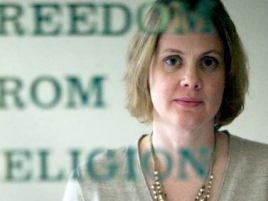Obama: Day of Prayer is a Go
By Annysa Johnson | Apr 22, 2010

President Barack Obama will proclaim May 6 as National Day of Prayer, the White House said Friday April 16, despite a ruling by a Wisconsin federal judge the day before that it is unconstitutional.
“We have reviewed the court’s decision, and it does not prevent the president from issuing a proclamation,” spokesman Matthew Lehrich said.
The decision by U.S. District Judge Barbara B. Crabb of the Western District of Wisconsin found that the National Day of Prayer violates the First Amendment prohibition against laws respecting an establishment of religion.
Freedom From Religion Foundation of Madison, Wis., had sued the administration of George W. Bush and later that of Obama in an effort to block the presidents from making their annual proclamations inviting Americans to set aside a day for prayer or meditation.
Anne Laurie Gaylor, co-president of the foundation and a plaintiff in the lawsuit, heralded Crabb’s decision as courageous.
“It’s an invasion of the freedom of conscience of Americans to have their president direct their prayer or tell them to pray,” said Gaylor, whose organization claims a membership of nearly 15,000 freethinkers, agnostics and atheists across North America.
Jordan Sekulow of the American Center for Law and Justice, which filed an amicus brief in the case on behalf of 31 members of Congress, said he was confident the decision would be overturned on appeal.
“This is one district court judge,” said Sekulow, a lawyer with the public-interest law firm founded by evangelist Pat Robertson. “It’s not like it’s happening all over the country. In no way do we think this is the mainstream of judicial thinking in the United States.”
Crabb postponed enforcement of the decision until all appeals are exhausted.
The U.S. Department of Justice said it was reviewing Crabb’s ruling before deciding on a next step.
In her ruling, Crabb acknowledged the deep divide over the role of religion in America, and the complex and often contradictory jurisprudence on the separation of church and state. She said the federal statute ordering the president to make the annual proclamation serves no secular purpose, casts nonbelievers as outsiders and goes beyond the mere acknowledgment of religion to encouraging a practice best left to individual conscience.
Cobb said her ruling was not an attack on prayer but an effort to ensure religious liberty.
“The same law that prohibits the government from declaring a National Day of Prayer also prohibits it from declaring a National Day of Blasphemy,” she said in the decision.
Tuesday’s decision traces the history of the day to a 1952 rally in Washington by the Rev. Billy Graham, in which he called for a national day of prayer and envisioned a “great spiritual awakening” for the capital with “thousands coming to Jesus Christ.”
It was introduced in the House the next day, then later in the Senate as a measure against the “corrosive forces of communism which seek simultaneously to destroy our democratic way of life and the faith in an Almighty God on which it is based.”
In 1988, at the urging of Campus Crusade for Christ and the National Day of Prayer committee, Congress enacted legislation requiring the president to issue an annual proclamation declaring the first Thursday in May as National Prayer Day.












